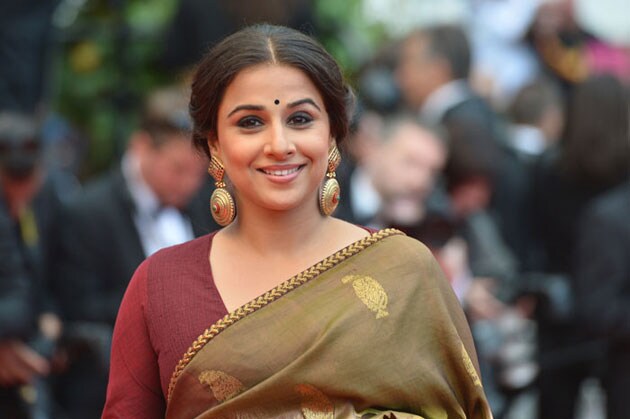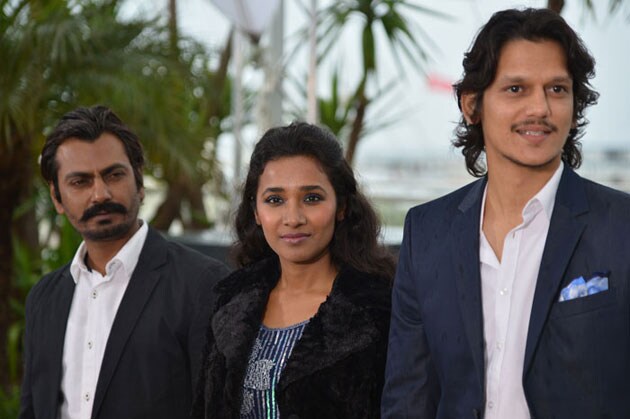
A still from the film The Lunchbox
Cannes:
In the run-up to the 66th Cannes Film Festival, India was tipped to be the flavour of the season. As if on cue, the skies dumped a whole lot of rain around the venue on the first few days of the event and the stars and fashionistas were sent scurrying for cover. The Mumbai monsoon sprang to mind. Sadly, the anticipated Shootout did not quite come off on the wet carpet.
As it has turned out in the first week of the festival, notwithstanding the healthy numbers that it has toted up on the Croisette this year, contemporary cinema from the world's most prolific film-making nation continues to languish on the fringes of the frame here.
The Big B, in an attire that was pure Bollywood, walked the red carpet on the opening night with the cast and crew of The Great Gatsby, but that brief flash of glory for Hindi cinema was quickly overshadowed, first by the torrent and then by the sprinkling of outstanding films, both in Competition and elsewhere in the festival.

Amitabh Bachchan with The Great Gatsby co-star Leonardo DiCaprio at Cannes.
As always, L'Oreal brand ambassador Aishwarya Rai Bachchan popped up at several events on the sidelines of the festival, while Vidya Balan has been a constant and winsome presence as a member of a formidable jury headed by Steven Spielberg.

Ash looked stunning in an Elie Saab gown on her day one at the Cannes red carpet

Vidya at the screening of the film Inside Llewyn Davis
But the two ladies can do little if the films that have come out of India - it is difficult to see why the Cannes selectors are so enamoured of this kind of moviemaking - simply do not have the legs to stand up and run with the best in the world.
India has two films in the official selection but neither the Midnight Screening of Monsoon Shootout nor the Special Screening of Bombay Talkies has set Cannes on fire. Not surprising!
Monsoon Shootout is the umpteenth take on Mumbai's criminal underbelly in which a rookie cop, a cynical senior and an axe-wielding killer face off in a one-story, multiple-scenario Run Lola Run construct. It is lensed and cut in way that is neither original nor particularly striking.

Tannishtha Chatterjee, Vijay Verma and Nawazuddin Siddiqui posed together during a photocall for their film Monsoon Shootout
Worse, Anurag Kashyap's Ugly, screened in the parallel Directors' Fortnight, is another foray into the dark alleyways of Mumbai. This unrelentingly bleak tale of a kidnap that also explores the themes of domestic violence and responsible parenting has too many characters and too many plot twists for its own good. It left most followers of Indian cinema rather cold.
Mercifully, debutant Ritesh Batra's The Lunchbox, a gracefully crafted, understated and tender portrayal of loners learning to dream and dare in a big city, has made a strong impact as India's lone entry in The Semaine de la Critique (Critics' Week). The film is in the running for the Camera d'Or and regarded as a strong contender for the prize.
The Lunchbox is a completely Indian film at heart but, in its making, it is globally oriented. Director Batra, obviously a talent to watch out for, eschews gimmickry, and tells his story with the kind of simplicity that only the truly talented usually achieve.

The cast and crew of the film The Lunchbox at the premiere at Cannes.
What is especially impressive about The Lunchbox is the manner in which it modulates the deeply emotional undercurrents in the story of a lonely housewife who develops a bond with a gloomy government accountant through little notes exchanged in a lunchbox that is delivered every day to the wrong address by Mumbai's famously infallible dabbawalas.
Not since Satyajit Ray's masterly Charulata (which, incidentally, is part of the Cannes Classics programme this year) has the plight of a not-so-happy married woman been depicted with such delicious irony, humanism and empathy in an Indian film.
The Lunchbox benefits hugely from the pivotal performances. Irrfan Khan informs the forlorn figure of an accountant on the verge of superannuation with layers of feeling. Nawazuddin Siddiqui, cast as a self-effacing man recruited to step into the shoes of the retiring official, captures the loneliness of an individual who has grown up in a crowded city without the comfort of anybody to call his own.
The Lunchbox is an unqualified triumph for theatre actress Nimrat Kaur, last seen in Peddlers, which screened in the same section in the previous edition of Cannes. She turns in a delectably controlled portrayal of a woman who seeks to regain the attention of her disinterested husband with her culinary skills.
Moral of the story: for Bombay talkies, ugly shootouts are passe; it is time to think out of the lunchbox!
As it has turned out in the first week of the festival, notwithstanding the healthy numbers that it has toted up on the Croisette this year, contemporary cinema from the world's most prolific film-making nation continues to languish on the fringes of the frame here.
The Big B, in an attire that was pure Bollywood, walked the red carpet on the opening night with the cast and crew of The Great Gatsby, but that brief flash of glory for Hindi cinema was quickly overshadowed, first by the torrent and then by the sprinkling of outstanding films, both in Competition and elsewhere in the festival.

Amitabh Bachchan with The Great Gatsby co-star Leonardo DiCaprio at Cannes.
As always, L'Oreal brand ambassador Aishwarya Rai Bachchan popped up at several events on the sidelines of the festival, while Vidya Balan has been a constant and winsome presence as a member of a formidable jury headed by Steven Spielberg.

Ash looked stunning in an Elie Saab gown on her day one at the Cannes red carpet

Vidya at the screening of the film Inside Llewyn Davis
But the two ladies can do little if the films that have come out of India - it is difficult to see why the Cannes selectors are so enamoured of this kind of moviemaking - simply do not have the legs to stand up and run with the best in the world.
India has two films in the official selection but neither the Midnight Screening of Monsoon Shootout nor the Special Screening of Bombay Talkies has set Cannes on fire. Not surprising!
Monsoon Shootout is the umpteenth take on Mumbai's criminal underbelly in which a rookie cop, a cynical senior and an axe-wielding killer face off in a one-story, multiple-scenario Run Lola Run construct. It is lensed and cut in way that is neither original nor particularly striking.

Tannishtha Chatterjee, Vijay Verma and Nawazuddin Siddiqui posed together during a photocall for their film Monsoon Shootout
Worse, Anurag Kashyap's Ugly, screened in the parallel Directors' Fortnight, is another foray into the dark alleyways of Mumbai. This unrelentingly bleak tale of a kidnap that also explores the themes of domestic violence and responsible parenting has too many characters and too many plot twists for its own good. It left most followers of Indian cinema rather cold.
Mercifully, debutant Ritesh Batra's The Lunchbox, a gracefully crafted, understated and tender portrayal of loners learning to dream and dare in a big city, has made a strong impact as India's lone entry in The Semaine de la Critique (Critics' Week). The film is in the running for the Camera d'Or and regarded as a strong contender for the prize.
The Lunchbox is a completely Indian film at heart but, in its making, it is globally oriented. Director Batra, obviously a talent to watch out for, eschews gimmickry, and tells his story with the kind of simplicity that only the truly talented usually achieve.

The cast and crew of the film The Lunchbox at the premiere at Cannes.
What is especially impressive about The Lunchbox is the manner in which it modulates the deeply emotional undercurrents in the story of a lonely housewife who develops a bond with a gloomy government accountant through little notes exchanged in a lunchbox that is delivered every day to the wrong address by Mumbai's famously infallible dabbawalas.
Not since Satyajit Ray's masterly Charulata (which, incidentally, is part of the Cannes Classics programme this year) has the plight of a not-so-happy married woman been depicted with such delicious irony, humanism and empathy in an Indian film.
The Lunchbox benefits hugely from the pivotal performances. Irrfan Khan informs the forlorn figure of an accountant on the verge of superannuation with layers of feeling. Nawazuddin Siddiqui, cast as a self-effacing man recruited to step into the shoes of the retiring official, captures the loneliness of an individual who has grown up in a crowded city without the comfort of anybody to call his own.
The Lunchbox is an unqualified triumph for theatre actress Nimrat Kaur, last seen in Peddlers, which screened in the same section in the previous edition of Cannes. She turns in a delectably controlled portrayal of a woman who seeks to regain the attention of her disinterested husband with her culinary skills.
Moral of the story: for Bombay talkies, ugly shootouts are passe; it is time to think out of the lunchbox!
